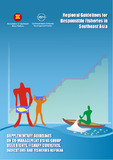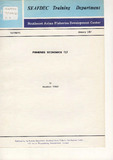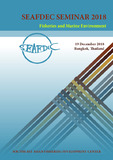Regional Guidelines for Responsible Fisheries in Southeast Asia Post- Harvest Practices and Trad
Abstract
Since 2000, the respective Departments of SEAFDEC established the Regional Guidelines for Responsible Fisheries in Southeast Asia Phase I, II and III as guidance to the Member Countries based on the specific article of the CCRF. As part of the program on Regionalization of the Code of Conduct for Responsible Fisheries (RCCRF): Phase IV Post-Harvest Practices and Trade, SEAFDEC Marine Fisheries Research Department (MFRD) organized the Core Expert Meeting from 4-6 May 2004 in Singapore. The meeting was attended by the core experts from the ASEAN and SEAFDEC Member Countries including members of the ASEAN Post-harvest Technology Network as well as staff from SEAFDEC MFRD and the Secretariat, in order to establish common understanding among core experts and SEAFDEC on the concept and principle of the RCCRF program particularly on scope and framework of Phase IV; to clarify issues/areas required for the formulation of the regional guidelines for responsible fisheries on post-harvest practices and trade; and to finalize RCCRF Phase IV process, activities and timeframe as well as Terms of Reference of the Core Experts.
The Meeting reviewed the CCRF Article 11 on Post-harvest Practices and Trade by clarifying issues and areas in regional fisheries context based on the preliminary review made by MFRD and the Secretariat, covering Article 11.1 Responsible fish utilization, Article 11.2 Responsible international trade, and Article 11.3 Laws and regulations relating to fish trade. After brainstorming and deliberation, the Meeting developed the 1st Draft of the Regional Guidelines for Responsible Fisheries on Post-Harvest Practices and Trade based on relevant technical recommendations, the Resolution and Plan of Action of the Millennium Conference, including results of implementation of subsequent initiatives. Subsequently, core experts coordinated with relevant national agencies within their country to obtain inputs for drafting the 2nd Draft of the Regional Guidelines and provided to SEAFDEC MFRD.
After compiling comments from the ASEAN Member countries, MFRD in collaboration with the Secretariat consolidated all national inputs into the 3rd Draft Regional Guidelines without country specific actions for finalization through the discussion at the Regional Technical Consultation on the RCCRF Phase IV: Post-harvest Practices and Trade to be organized in Chiang Mai, Thailand from 26 to 29 October 2004. It is envisaged the result of deliberation the Regional Guidelines will provide a basis to facilitate the implementation of the CCRF at the national level in the Southeast Asian Region.
Citation
Southeast Asian Fisheries Development Center, (2000). Regional Guidelines for Responsible Fisheries in Southeast Asia Post- Harvest Practices and Trad. training Department, Southeast Asian Fisheries Development Center.
Collections
Related items
Showing items related by title, author, creator and subject.
-
Regional Guidelines for Responsible Fisheries in Southeast Asia Supplementary Guidelines on Co-Management Using Group User Rights,Fisheries Statistics, Indicators and Fisheries Refugia
SEAFDEC,ASSOCIATION OF SOUTHEAST ASIAN NATIONS (SEAFDEC, 2006-03)The Guidelines on “Use of Indicators for the Sustainable Development and Management of Capture Fisheries” which is to large extent related to fishery statistics, was developed to complement the programs on statistics, thus, ... -
Fisheries Economics (I)
Yamao, Masahiro (Training Department, Southeast Asian Fisheries Development Center, 1987-01)This textbook was initially prepared as part of the lectures on Fisheries Economics at SEAFDEC, in 1986. The contents are obviously not only introductory but also essential to our subject. In addition to my summarized ... -
SEAFDEC Seminar 2018: Fisheries and Marine Environment
Southeast Asian Fisheries Development Center, Training Department (Training Department, Southeast Asian Fisheries Development Center, 2018)Proceeding of SEAFDEC Seminar 2018: Fisheries and Marine Environment




